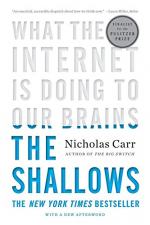
|
| Name: _________________________ | Period: ___________________ |
This test consists of 5 multiple choice questions, 5 short answer questions, and 10 short essay questions.
Multiple Choice Questions
1. What did Page and Brin formally announce in 2004 in relation to books?
(a) The Scribe Project.
(b) The Papyrus Project.
(c) The Google Print program.
(d) The Lexicon Project.
2. What publisher brought a book out in 2009 that had been created with Microsoft's PowerPoint presentation software?
(a) Penguin.
(b) Harper Books.
(c) O'Reilly Media.
(d) Random House.
3. What did Samuel Johnson do on the night of April 18, 1775, when he visited the library at Cambridge's grand villa?
(a) Dash to the shelves to read the titles on the spines of the books.
(b) Start tearing pages from the books he was interested in.
(c) Light every book on fire.
(d) Shove books in his leather bag to steal for later.
4. How long did Eric Schmidt tell The Wall Street Journal in 2005 that it would take Google to organize the world's information and make it universally accessible and useful?
(a) 25 years.
(b) 1000 years.
(c) 300 years.
(d) 100 years.
5. Fewer than one in ten page views extend beyond which of the following time frames, according to German researchers Carr cites in Chapter Seven?
(a) 1 minute.
(b) 5 minutes.
(c) 30 seconds.
(d) 2 minutes.
Short Answer Questions
1. What is the name Google a play on?
2. What does Carr say, in Chapter Eight, that Larry Page has always viewed Google as an embryonic form of?
3. In Chapter Six, what does Carr say is the one form of popular media that has been most resistant to the Net's influence?
4. In Chapter Five, which newspaper does Carr cite as ceasing its print edition in 2009?
5. In Chapter Five, what does Carr say happens to other media as the Net expands?
Short Essay Questions
1. What did Google's Eric Schmidt tell the Wall Street Journal is Google's main goal, and how long does he expect it to take to achieve that goal?
2. In Chapter Five, how does Carr point out that the architecture of the Bronx Library Center has changed to reflect the supremacy of the Internet?
3. In Chapter Seven, about how long did researcher Gary Small find that it took for people's brains to become rewired after using the Internet?
4. In Chapter 7, what idea from Samuel Johnson does Carr end the chapter with?
5. What does Marissa Mayer, then a high-level executive at Google, say of design on the web?
6. What is the Flynn effect?
7. What kinds of problems did Google's effort to digitize all the books ever printed run into?
8. In Chapter Eight, what sentiment of the novelist Nathaniel Hawthorne's does Carr highlight?
9. What did Patrician Greenfield's 2009 Science article describe in terms of the skills people acquire from Internet use?
10. In Chapter Seven, how did educators' hopes for the positive effects of students reading texts with hyperlinks work out?
|
This section contains 900 words (approx. 3 pages at 300 words per page) |

|




